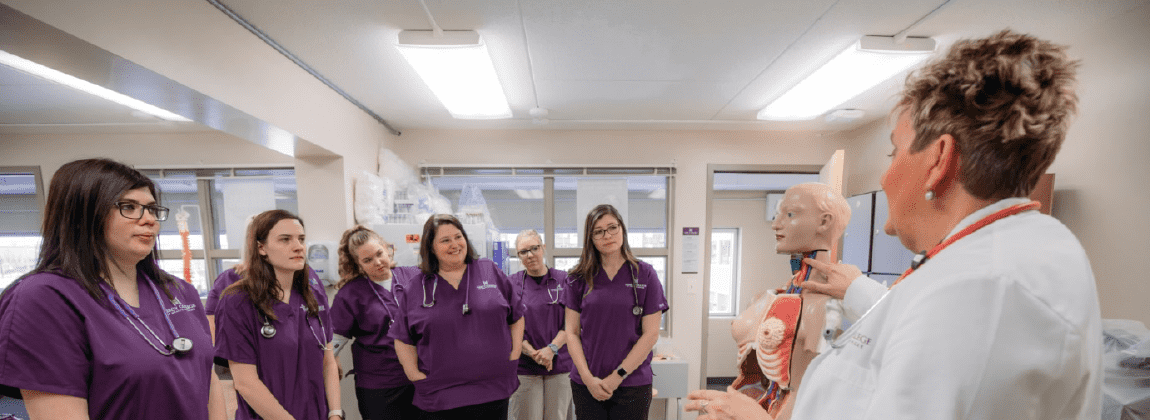Growing the Nursing Industry to Meet Demand in DSM

The US Bureau of Labor and Statistics projects that healthcare occupations will grow 18% from 2016 to 2026, adding about 2.4 million new jobs to the national market. According to Iowa Workforce Development, healthcare and social assistance accounted for 223,381 jobs in Iowa in 2017, with an average annual wage of $44,649.
Healthcare occupations are projected to add more jobs in the next decade than any other occupational group. The individuals expected to fill these jobs, however, are projected to have a significant skills gap due to the lack of health science education needed to meet this increasing demand. In order to bridge this educational gap, Mercy College of Health Sciences constantly seeks innovative ways to develop student’s technical and soft skills required to meet the needs of Iowa and the surrounding region.
Employers and prospective students are demanding healthcare education from Mercy College. Over the past year, Mercy College has experienced record new student enrollment and a rapid interest and growth in our healthcare programs. Few educational degrees offer a guaranteed prospect of a high paying job post-graduation
Our Body of Work
A shortage of healthcare providers is not a new phenomenon, and Mercy College has been a leader in providing for these needs since 1899. During World War II, many nurses left their civilian jobs to enlist in the military and support the war efforts, causing a shortage of nurses nationwide and abroad. The Bolton Bill, enacted in July 1942, established the Cadet Nursing Program, which supported nurses’ educational costs following the guarantee of service as a nurse for the duration of the war. The following year, 90% of Mercy College’s nursing graduates heeded this call to action and entered a military branch.
This year, Future Ready Iowa Alliance announced the approval of the Last-Dollar Scholarship and You Can Go Back Iowa grants. These awards incentivize individuals to obtain an education in high-demand skills areas designated by the State Workforce Board. Similar to the Cadet Nursing Program of 1942, these opportunities support the Education Drives Our Greater Economy (EDGE) challenge to reduce the skills gaps in critical fields, including healthcare.
The Anatomy of Action
At Mercy College, students can explore a career ladder that includes stackable credentials in programs which allow students to apply credits from both their prior education and work experiences toward their future degrees.
Students can obtain a certificate from Mercy College, enter the workforce, and, through our online, evening, and weekend programs, obtain an associate or bachelor’s degree in a timeline that is convenient for them. Our curriculum is designed to support a student’s individual needs, every step of the way.
Mercy College’s year-round coursework enables students to complete their degrees and enter the workforce in an accelerated format. A freshman can enroll with no prior college experience and receive a bachelor’s degree in just two and a half years. This marks a significant difference from public and private counterparts who struggle to offer their students flexible and timely degree options.
Last fall, we launched the Accelerated Bachelor of Science in Nursing (BSN) program that enables students to earn their BSN in just one year. This program has received overwhelming interest and is just one example of how Mercy College is innovating health science education to meet the needs of our students and employers.
Mercy College also has partnerships with Waukee APEX and the Dowling Maroons in Health Sciences to inform students of their healthcare career options earlier in their career exploration.
The EDGE challenge of ensuring 75% of Greater Des Moines working-age adults have degrees, certificates and other credentials by 2025 that align with workforce needs is of vital importance for Iowa’s ability to lead the region and country. Mercy College continues to find ways to support the EDGE challenge and prepare Greater Des Moines for the growing demands of the healthcare sector.
Please your support by signing up for EDGE and take the pledge today!
Interested in starting your healthcare career? Check out Mercy College at mchs.edu.
Mercy College of Health Sciences is the only private Catholic college in central Iowa and is accredited by the Higher Learning Commission (HLC). Located in downtown Des Moines, Mercy College prepares graduates for service and leadership in the healthcare community with a wide-range of bachelor, associate, and certificate programs. Mercy College’s liberal arts and sciences education develops compassionate caregivers and leaders. Visit mchs.edu or call (515) 643-3180 to learn more.
Education Drives our Greater Economy (EDGE)aims to ensure that 75% of DSM working-age adults have postsecondary degrees, certificates or other credentials by 2025 that align with workforce needs. Sign up and take the EDGE Pledge today!
Members of the nursing class of 1944 posed in student attire, uniforms, and habit, depicting their professional roles. Included: Leila Clausen (student), Margaret Blackmer (Navy), Miralda Schilt (modeling habit), Bernice Spect (Army), and Loretta Moore (staff).
Matt Romkey
Matt Romkey is the VP of enrollment and external engagement at Mercy College of Health Sciences. Matt is an active leader in the community serving on numerous boards and committees. He received the Business Record'sForty Under 40 recognition in 2019. Matt and his family reside in West Des Moines.